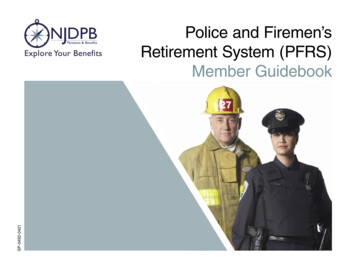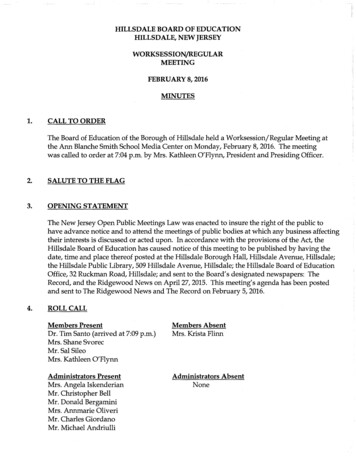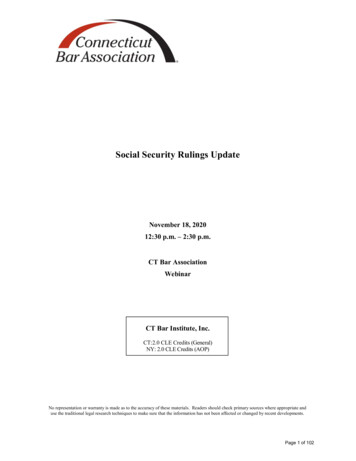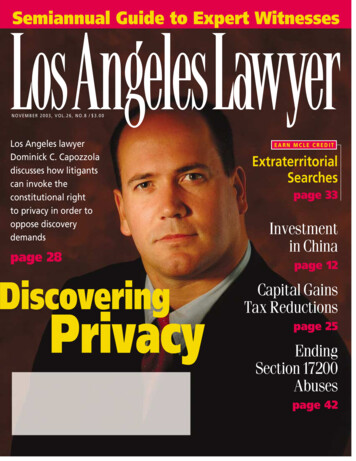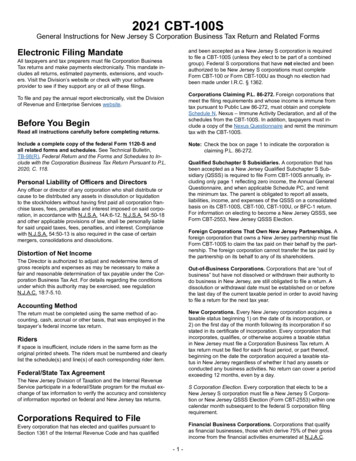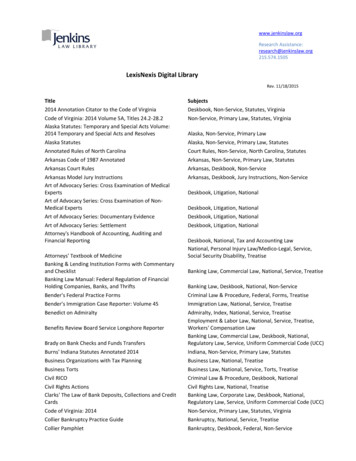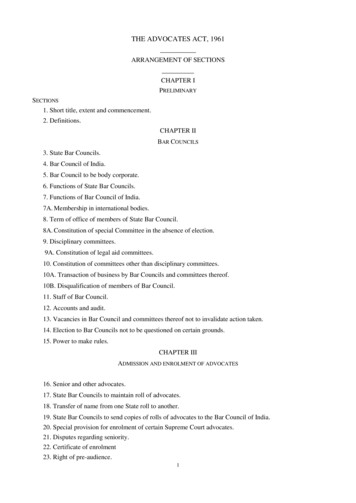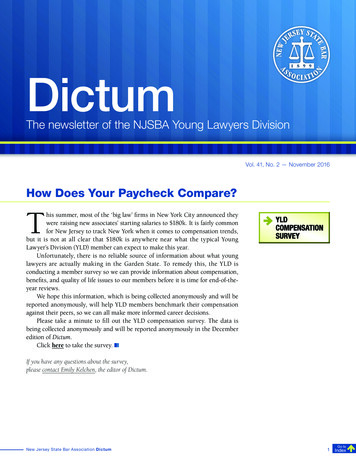
Transcription
DictumThe newsletter of the NJSBA Young Lawyers DivisionVol. 41, No. 2 — November 2016How Does Your Paycheck Compare?This summer, most of the ‘big law’ firms in New York City announced theywere raising new associates’ starting salaries to 180k. It is fairly commonfor New Jersey to track New York when it comes to compensation trends,but it is not at all clear that 180k is anywhere near what the typical YoungLawyer’s Division (YLD) member can expect to make this year.Unfortunately, there is no reliable source of information about what younglawyers are actually making in the Garden State. To remedy this, the YLD isconducting a member survey so we can provide information about compensation,benefits, and quality of life issues to our members before it is time for end-of-theyear reviews.We hope this information, which is being collected anonymously and will bereported anonymously, will help YLD members benchmark their compensationagainst their peers, so we can all make more informed career decisions.Please take a minute to fill out the YLD compensation survey. The data isbeing collected anonymously and will be reported anonymously in the Decemberedition of Dictum.Click here to take the survey.If you have any questions about the survey,please contact Emily Kelchen, the editor of Dictum.New Jersey State Bar Association Dictum1Go toIndex
Inside this issueHow Does Your Paycheck Compare?1Practice Tips from the YLD Chairby Marisa Trofimov4Bi-Lingual Lawyering: Barriers and Advantagesby Jonathan Amira6Raise Your Profile with Public Speaking8A Lawyer’s Best Friendby Aliza Anvari9Do You Have Something to Say?11Happenings11The Bar Wants to Know What Young Lawyers Think12Save the Date12The opinions of the various authors contained within this issue should not be viewed as those of theYoung Lawyers Division, Dictum, or the New Jersey State Bar Association.New Jersey State Bar Association Dictum2Index
Young Lawyers Division LeadershipCHAIRMarisa B. TrofimovThe Deni Law Group, LLC32 Church Street, Suite 2Flemington, NJ onas K. SeigelSeigel Capozzi Law Firm, LLC505 Goffle RoadRidgewood, NJ RDana M. Van LeuvenVan Leuven Law, LLC170 Changebridge Road, Unit B3-1Montville, NJ h A. SaadehThe Law Office of Rajeh A. Saadeh, LLC50 Division Street, Suite 501Somerville, NJ 08876908-864-7884rsaadeh@rajehsaadeh.comIMMEDIATE PAST CHAIRJames J. UlianoChamlin Rosen Uliano & Witherington268 Norwood AvenueWest Long Branch, N VE COMMITTEEMichael A. AustinLeah BartlomeAlyssa BongiovanniKatherine M. CaolaDylan DindialMark R. FriedmanMeredith FriedmanElizabeth Uliano GiblinTyler HallTiffany L. HeinemanKatrina M. HomelChristopher KeatingEmily Stever KelchenHyun J. LeeThomas J. ManzoDaniel MellorVictoria MercerVictoria D. MirandaRachel J. NguyenNicole O’HaraMarc PolesHelen M. QuanCory RothbotCorrie SirkinBrandon WolffThomas ZuppaDictum is the publication of theNJSBA Young Lawyers Division (YLD),and is a member-driven newsletter.We welcome submissions,including articles and news on anyrelevant topic, such as practice tips,work/life advice, and informationregarding upcoming meetings andevents. Please submit articles toEKelchen@civiljusticenj.org with thesubject line YLD Dictum.New Jersey State Bar Association Dictum3Go toIndex
Practice Tips from the YLD Chairby Marisa TrofimovAs the chair of the Young Lawyers Division, I amtechnically a young lawyer; however, I recentlyrealized I have been practicing for almost 10years. Over the years I’ve learned a lot about what itmeans to be a good attorney, thanks in large part to avery involved mentor who helped me along the way.Below are 15 tips I think every young attorney shouldknow before delving into the practice of law to helppreserve his or her reputation in the legal communityand perhaps make life a little bit easier.1. Remember that every email, letter and even quotesfrom telephone conferences can be presentedto the court. It can be tempting, when you comeacross a rude attorney, to just give it right back, butremember it could come back to bite you. If you comeacross a truly obnoxious opposing counsel, there isnothing wrong with insisting that all communicationtake place in writing. There is no upside to takingthe bait and sinking to his or her level. And, it isprobably wise for most communication with pro selitigants to in writing throughout a case.2. Take everything every client says with a grainof salt. I have exactly one client in my entire careerthat I actually trust now without seeing verification.One. And I have been representing that client foreight years now. It is not necessarily that clients willpurposefully lie to you, but they are frequently soemotional they see things through their own lens.Do not hesitate to ask clients for proof of what theyare saying before relaying that information to anadversary or court.3. Remember, it is not your case. You did not makethe mess in which your client finds him or herself.It can go a long way toward settling a case down theroad to separate yourself from your client to opposingcounsel early on. It also does not harm your clientin any way to be civil or even friendly to opposingcounsel. Remember, it is very likely you may have towork with that same opposing counsel again.4. Return phone calls, emails and letters promptly.My general rule of thumb is to try to return anyclient or attorney call within 24 hours (on weekdays,New Jersey State Bar Association Dictum5.6.7.8.of course). If the question is not urgent, a quickemail from you or contact from your staff indicatingyou will get back to them even in a week is perfectlyacceptable. Sometimes all it takes for clients oropposing counsel to calm down is to recognize thatyou are paying attention.Do not throw another attorney under the bus,so to speak, unless absolutely necessary. Thereis nothing a court hates more than having to serveas referee to two attorneys. And as I mentionedabove, it is highly likely you will have to work withopposing counsel again. Even if you are draftinga motion certification to be signed by your client,making allegations against opposing counsel inthat certification is not wise, unless it is in therare instance where opposing counsel is actingunethically. It only serves to burn the bridge withthe opposing counsel and anger the court.Except in some extreme exceptions, if anotherattorney has already been retained on the otherside call that attorney to introduce yourself anddiscuss the case before you run to court and fileany application (again, there are exceptions to thisrule). You never know when litigation can be avoidedonce two levelheaded attorneys take the emotionout of a case. Plus, it is just plain polite to introduceyourself as long as it will not harm your client’s case.Always remember that you are the attorney,not your client. Even if you are representingother attorneys, they are typically too emotionallyinvolved in the case to always make rationaldecisions. Remember that your job is to guide aclient, not simply act as his or her puppet.Be prepared, even over prepared. Even if you areconfident that a case will settle, keep in mind beingunprepared makes you look bad if the case does notsettle. Other attorneys can also sense when you areprepared. It may be the difference between opposingcounsel recommending settlement or litigation.Never give information to a client, an adversary, andespecially the court if you are unsure of the answer.It is perfectly acceptable to tell them you need to4Go toIndex
9.10.11.12.find out the information, whether by conductingmore research (a good excuse for clients), checkingyour notes, or asking your client.Provide your adversary with courtesies (suchas extensions on motion dates) when it will notnegatively impact your client. You might need areturn favor someday. For example, if an attorney(or even a pro se litigant) calls and requests yourpermission for a one-week extension of a motion,give it to them if it will not substantially harmyour client. We all know the court is going to grantthe extension anyway, so why make yourself lookunreasonable when your objection will not changethe court’s decision (provided it will not harm yourclient). The same goes for when you serve paperson an adversary. There are those attorneys who willpurposefully serve motions or letters demanding animmediate response right before opposing counsel’spre-planned vacation. (Or in my husband’s case, rightbefore the birth of each of our children by plannedC-section. And it was the same attorney each time.)Other than angering the other attorney and possiblythe court, there is nothing to gain by this behavior.Treat court staff with respect. Believe me, I haverun across my fair share of court staffers who give methe most asinine responses, frequently because theyhave no legal background and do not understand theconsequences of their decision on other aspects of acase. But, they still deserve to be treated with respect.Just remember, the court staffers have to deal withall sorts of ridiculous pro se litigants, in addition toattorneys. And, if appealing to your sense of empathydoesn’t convince you to treat them with respect,just remember they could work in that courthouse,granting or denying your requests, for decades tocome. And believe me, they all talk.Do not serve papers (motions, letters, etc.) on anadversary at the end of the day, especially on aFriday, if it can be avoided. Most Outlook emailprograms have a way to program when your email issent, so use it.Do not push the envelope when it comes tofollowing Court Rules, Rules of Evidence orRules of Ethics. Sure, you may get away with it onetime, but both the judge and opposing counsel willcertainly remember your behavior, and it will startto sully your reputation.New Jersey State Bar Association Dictum13. Beware of clients who have already fired aprevious attorney. Sometimes clients do have alegitimate reason for firing a previous attorney.For example, maybe that attorney was one of thebad apples who never returned calls. But approachthose clients with caution. The likelihood they willturn on you too is quite high, especially if you willbe their third attorney for the same issue. See theadvice below if you have no control over whichclients you are required to handle.14. Always remember your client can end up beingyour worst adversary. The best way to combat this isto document, document, document, even if you can’tbill for the documentation. It also may be helpful tosend the client a formal letter or email if he or sheis becoming unreasonable. Again, you may not beable to bill for this correspondence, but you will behappy you sent it if your client becomes even moreadversarial down the road. Lastly, you can write amemo to the file on contentious issues so you havewritten your position in real time and can refreshyour memory later if your client turns on you.15. Try your best to leave work at work. You maynot have much control over your work life as ayoung attorney, but there are things you can do. Forexample, I have made the choice not to give out mycellphone number to clients. After having receivedsix phone calls on Thanksgiving Day during myfirst year of practice from the same distraught (andmentally ill) client with a non-urgent issue, it seemedlike a no brainer going forward. You may not havethat option if your firm supplies your cellphone, butyou can choose not to socialize with clients outside ofwork or be Facebook friends with clients. For somepractice areas, this might not work, but for individualclients I have found it helps not to blur the linesbetween work and personal life (especially whenindividual clients like to get free advice over lunch).Lastly, I have found that, for me, it is psychologicallyhelpful to stay late and finish work, rather than do itfrom home. That way I do not associate home withmy work. But again, that is what I have found worksfor me. It might not work for everyone.Marisa Trofimov currently practices family law at the DeniLaw Group, LLC in Flemington, and is chair of the YoungLawyer’s Division of the NJSBA. She is a graduate of YaleUniversity and Seton Hall University School of Law.5Go toIndex
Bi-Lingual Lawyering: Barriers and Advantagesby Jonathan AmiraMarketing your skills is essential for finding theright job in the legal profession. For me, oneparticular skill I was able to highlight whenit came to applying for jobs was my ability to speakSpanish. Yet, practicing law in another language besidesEnglish comes with a unique set of challenges I neveranticipated this early in my career. Along the way, Ihave not only been able to improve this skill, but honeit from conversational into professional aptitude. Beingbilingual has been both an asset and a challenge unlikeany I’ve anticipated as a practicing attorney.My first language is English, and I subsequentlylearned Spanish. My mother emigrated from Colombiato the United States as a teenager, and taught herselfEnglish at home by watching the news, and readingbooks. My father is American. English was always ourmain spoken language in the house, but my mothermade it a point to give me some exposure to Spanish.My formal Spanish-study period clocks in at about 10years (from middle school to college). In college, I beganto study more seriously, ultimately majoring in thelanguage (in addition to psychology) and attended twostudy abroad programs in Spain and Argentina. Currently, I practice by speaking with my mother, watchingDVDs and Blu-rays dubbed in Spanish, and playinggames on the language-learning app Duolingo. Whilehoning my vocabulary and grammar is always helpful,there are challenges that go beyond language ability.When I began working as an attorney, doing perdiem immigration work for a solo practitioner, the firstchallenge I realized in discussing the law in anotherlanguage is semantic expression to other clients. I amperfectly comfortable having a normal conversation andmaking small talk. However, the law is a completelydifferent story. As a new attorney, trying to explain thelaw in layperson English to a client is difficult enoughas it is. For me to interpret and make comprehendiblethe abstract concepts of law in another language greatlyincreases difficulty. Additionally, not everything inEnglish translates perfectly to Spanish. It’s a challenge tosay: “So, you have a traffic ticket in violation of N.J.S.A.New Jersey State Bar Association Dictum39:3-10b for driving without a license. I can try to getit amended down, but then there’s your DWI ” Muchof the time I find myself doing less-literal interpretation,because it doesn’t make as much sense in literal Spanish. Instead, I explain legal concepts and the work I planto do with more description and plain words. So myexplanation in literal English comes out more like: “Youhave a traffic ticket for driving without a license. I canget it reduced, but you also have this DWI.” The expression becomes more simplified.My primary concern, though, becomes misrepresenting the law to the client. Lawyers are not trained to becertified interpreters, but it is still my job to give my clienta fair and accurate representation of what the law is. Togive clear expression of the law in a different language,you have to be very careful about how you choose yourwords, and be sure to simplify but not oversimplify.The other major hurdle I have is that when dealing with foreign clients there can be a cultural barrierinvolved in understanding the law. Generally speaking,my impression is many Americans have a rudimentary concept of what laws are and how they work in ourcountry, whether it’s what the first few amendments tothe Bill of Rights are or how a trial works. Put yourselfin a foreign client’s position. If you were in a foreigncountry and found yourself in a legal predicament,especially a country where you are still learning orstruggling to comprehend the language, are you goingto know or understand what’s going on? That’s the situation many of my clients are finding themselves in. Asa new lawyer, this kind of situation can be very challenging to clarify and help them comprehend. However,regardless of my skill in being able to communicate withmy client, I am still professionally obligated to utilize acourtroom interpreter under any circumstances. To apoint, it is always to the lawyer’s benefit to hire a professional legal translator when needed.On the other hand, the most obvious advantageof speaking two languages is that it expands my clientbase, considerably. Not only does the potential for morebusiness grow, but so does my personal ambition to help6Go toIndex
as many people as I can who are in need of legal services. As a new attorney, I still havecertain challenges learning to keep up with the law, in addition to how to conduct myselfin an office environment, utilize the technology and resources at my disposal, etc. As a newattorney working with clients in another language, my challenges often feel more complex,as indicated by the differences in semantic expression and cultural differences. Realisticallyspeaking, I need to remind myself that in due time I will learn as much of the law as I needto, both in English and Spanish, and that my challenges, while unique, will eventually giveway to ones more complex, but surmountable.Jonathan Amira is an associate at Leschak & Associates, LLC in Freehold. He is admitted to practicein New Jersey District Court and federal immigration court.New Jersey State Bar Association Dictum7Go toIndex
Raise Your Profile with Public SpeakingThe New Jersey State Bar Foundation believes “informed citizens are better citizens.”Whether it’s a consumer curious about lemon laws, a caregiver who needs to betterunderstand disability law, a senior citizen interested in estate planning, or a student whois considering a career in law, your expertise can help educate citizens to better understand theirlegal rights and responsibilities. The easiest way to connect with people who are curious aboutthe law is to volunteer to participate in the bar foundation’s Speakers Bureau.You choose the counties you are willing to travel to, the type of audience you are willing tospeak to, and the topics related to your areas of expertise, and the bar foundation will contactyou if they receive a request for a speaker that matches your criteria. It’s that easy.There are no meetings to attend and no fees to pay. The only requirement to participate iscurrent NJSBA membership.If you would like additional information, contact Jodi Miller at 732-937-7529, or if you areready to volunteer right now, click here to fill out the volunteer form.New Jersey State Bar Association Dictum8Go toIndex
A Lawyer’s Best Friendby Aliza AnvariBubba loved probation and parole days. He wouldmarch out into the police department waitingroom with all the gusto of a circus performer.Tail wagging fiercely, he greeted all subjects with aconcerted sniff and then, sniff test permitting, offeredhimself out to receive pets and head massages.No one can relax an anxious crowd more than man’sbest friend. Bubba’s mere existence—as an overweightChihuahua sporting a Napoleon complex—was comical.His ability to spread smiles was infectious. He was usedas fake Taser target practice by the officers and alwaysremained a good sport about it. It was as if everyone wasin on the joke—everyone except Bubba, who remainedhappily oblivious.I loved bringing my dog to work. It was the singlegreatest benefit to working as a police department prosecutor. Dogs were not prohibited, as they were routinevisitors to the police department. Animal control issuesin the sleepy and quaint New Hampshire town I workedin frequently fell in the realm of police enforcementduties. So it was this saving grace that allowed me tobring my best friend to work.Steadfastly, Bubba became the de facto mascot andfixture at the police department. He strolled in townparades, participated in police community events andproudly sported a scarf with the police department acronym monogrammed in gold.For seven years Bubba shared in my work-relatedtrials, triumphs and tribulations. His warm chubbybody was there to offer comfort when a case was lostand offer stress relief when times were tough. He madehimself available not only to me, but to the wholedepartment, including visitors.His favorite place to sleep was under my desk andcurled up in his bed by my feet. I may have been downto the wire, pulling my hair out trying to meet motiondeadlines, but was soon brought back to earth by thesound of Bubba snoring softly, a gentle reminder of thethings that were truly important in life.New Jersey State Bar Association DictumBubba wouldalert me when itwas time to packup and go home.He wou ld nottake ‘no’ for ananswer. (Oddlyenough, despitehis breed, Bubbahad the brawny build of a boxer and the bark to match,both commanding and resolute). His bark would prevailagainst my protests. We would finally go home and Iwould get some badly needed rest.I remember one work story quite fondly. It camefrom the chief. He said he was meeting with someofficers on a very serious matter involving a death. Hesaid things were very tense in the meeting, but Bubbawalked in as if he was involved in the discussion. Somehow Bubba’s presence diffused the stress of that moment(probably because the focus shifted to trying to kick himout of the room). It made me proud that my pet served aspecial purpose that day.Bubba passed in February of this year. We werealone and he died in my arms, struggling for his lastbreath. (Bubba had been battling a heart condition thelast year of his life—a life only prolonged through costlymedication.)Bubba’s death devastated me. This wonderful creature had been my companion for nearly 14 years, hisentire life. I would joke he had been my longest runningmale relationship; boyfriends came and went, but Bubbawas always by my side. He was my rock, my constant.He would not forsake me for being crabby, gainingweight or talking too loud. He would be by my sidewhen I was tired, weak or down on my luck. I didn’teven need a leash for him. He never strayed far. He andI made a pact long ago that we were in this thing calledlife together.9Go toIndex
I could cite plenty of articles that laud the mental health benefits of bringing a pet towork, but it wouldn’t do Bubba justice. What he offered to a teary victim or a reluctantwitness was something more than sympathy. It was something akin to empathy and, oddlyenough for a canine, humanity.One day, when I am ready, I will get another dog. And I hope I will be lucky enough tobring him or her with me to the office. After all, what could be better than working besideyour best friend?Aliza Anvari is an attorney licensed in New Jersey, Pennsylvania and New Hampshire. For nearlyseven years, she was employed as a prosecutor for Littleton, New Hampshire. She recently movedback to South Jersey, where she currently wears the hats of a real estate agent, court-appointedspecial advocate (CASA) and lawyer.New Jersey State Bar Association Dictum10Go toIndex
Do You HaveSomething to Say?Do you have something to say that you think othermembers of the YLD should know about? Why notsubmit an article or announcement to the YLD’snewsletter, Dictum?In the next issue of the newsletter we would like toprint articles on the following topics:End of the year reviews: How to prepare for yourown and how to prepare when you are a reviewer.Goals: Setting professional goals for the New Yearand tips for actually making progress on them.In the spring, we would like to publish articles about:Clerking: How did you get your clerkship and howdid you make it a success?HappeningsDid you attenda cool legal orcharitable event?Did you get apromotion or take anew job?Let us know, and you maybe featured in Dictumand on the YLD’s socialmedia accounts. Shoot anemail with pictures and asummary of your activitiesto Dictum’s editor,Emily Kelchen.Pro bono experiences: Do you have a story aboutyour experiences to share?E-filing and bail reform: Are these topics impactingyour practice or your clients?We are also open to publishing other submissions of interestto young lawyers, so don’t let this list of topics limit your writing.Submissions to Dictum should be 1,500 words or less, andconcern something of interest to young lawyers. The deadline tomake it into the next edition of the newsletter is Dec. 1. Pleaseemail anything you would like considered for publication toDictum’s editor, Emily Kelchen, with Dictum in the subject line.New Jersey State Bar Association Dictum11Go toIndex
The Bar Wants to KnowWhat Young Lawyers ThinkThe New Jersey State Bar Association is conducting a listening tour. The idea behindthe project is for senior NJSBA staff to hold small listening tour/focus group meetingsto gauge the interests of young attorneys to ensure the NJSBA is relevant to theirneeds. Group size will be limited to no more than 10 people per location, to maximize theinteraction.This is your opportunity to provide feedback, share ideas, connect with colleaguesfrom your area and help the NJSBA shape the future of programs, services and benefits ofmembership. Food, beer and wine will be served.The first session was held on Nov. 1. If you are interested in participating in a futurefocus group, see the dates/locations below and contact Paula Portner, senior managing director of membership, at pportner@njsba.comAs a thank you for your time, each attendee will receive a 20 coupon for a future NewJersey Institute for Continuing Legal Education program or product.Wednesday, Nov. 96 – 7:30 p.m.Trenk Di Pasquale Webster347 Mt Pleasant Avenue #300West Orange, NJ 07052Thursday, Nov. 106 – 7:30 p.m.New Jersey Law Center1 Constitution SquareNew Brunswick, NJ 08901Tuesday, Nov. 296 – 7:30 p.m.Cooper Levenson1415 Marlton Pike (Route 70) East, Suite 205Cherry Hill, NJ 08034Thursday, Dec. 76 – 7:30 p.m.McElroy, Deutsch, Mulvaney & Carpenter, LLP1300 Mt Kemble AvenueMorristown, NJ 07960New Jersey State Bar Association DictumSave the DateNov. 17—Job Fair at the NJSBA Law CenterClick here for additional information andregistration.Jan. 3—YLD Executive Committee MeetingThe YLD executive committee meetings areopen to all YLD members looking to getinvolved with the state bar. The meetings areheld at the New Jersey Law Center in NewBrunswick at 6:30 p.m. Dial-in information isavailable for those who cannot attend in person.Everyone typically goes to dinner together afterthe meeting.Feb. 7—YLD Executive Committee MeetingMarch 7—YLD Executive Committee MeetingApril 4—YLD Executive Committee Meeting12Go toIndex
The Deni Law Group, LLC 32 Church Street, Suite 2 Flemington, NJ 08822 908-782-2900 mtrofimov@denilaw.com CHAIR-ELECT Jonas K. Seigel Seigel Capozzi Law Firm, LLC 505 Goffle Road Ridgewood, NJ 07450 201-444-4000 jseigel@seigelcapozzi.com TREASURER Dana M. Van Leuven Van Leuven Law, LLC 170 Changebridge Road, Unit B3-1 Montville, NJ 07045 973 .

